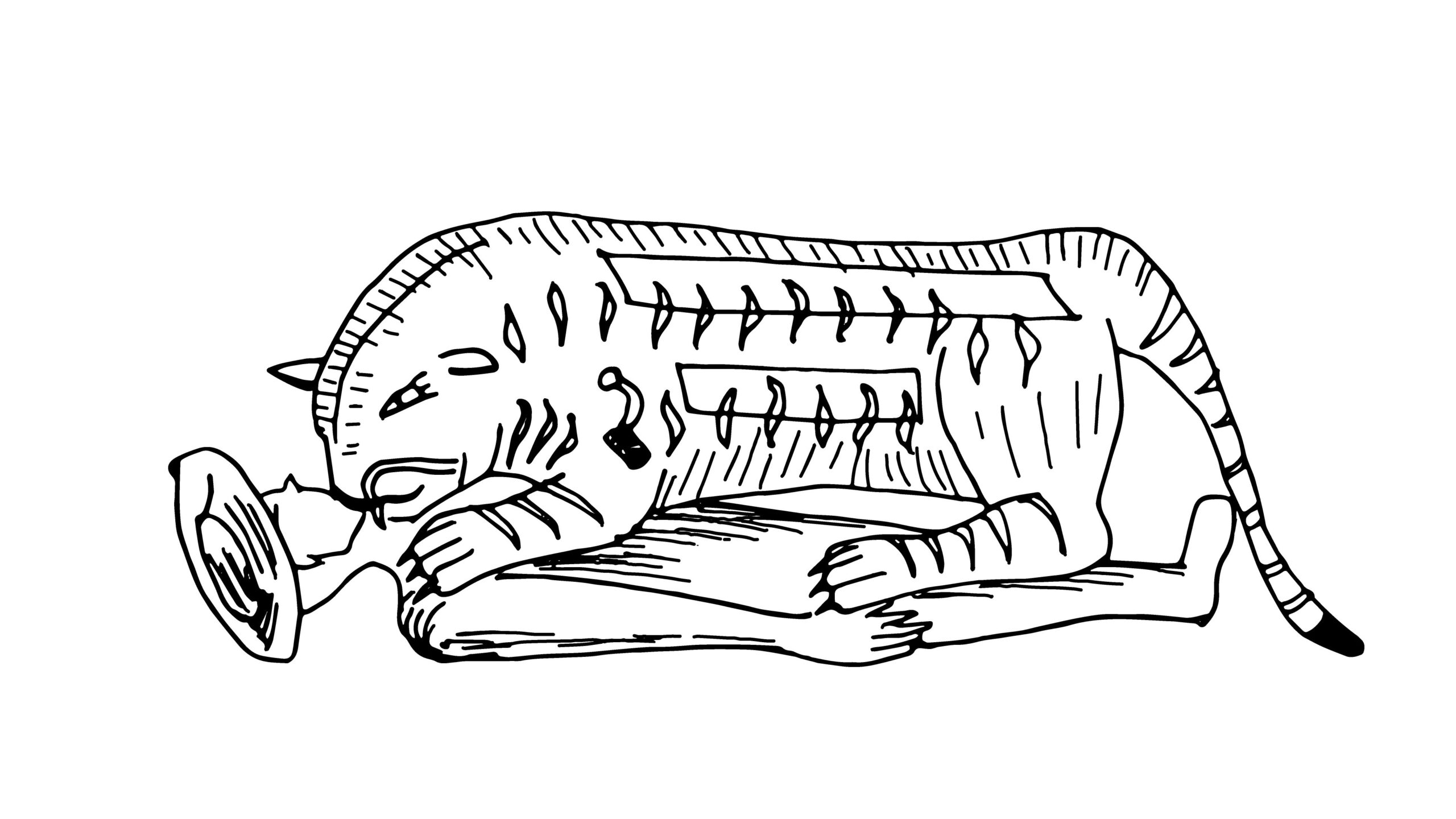Abbas, a 17-year-old woodcarver from the kingdom of Mysore, is drawn into service by Tipu Sultan, in order to build a giant tiger automaton for Tipu’s sons, a gift to commemorate their return from British captivity. In this excerpt, Abbas arrives at the workshop of the famed French clockworker and expat, Lucien Du Leze, to begin construction of the tiger.
Of all the rooms Abbas has entered over the past two days, this— the workshop of Lucien Du Leze—is the one that steals his breath.
The walls bristle with tools, at least three of every kind and size, veiner and saw and adze and ax, gouges so small and with so many different tips that he cannot predict what all they can do. Nor does he know what to do with himself in their presence, what to touch first or not touch at all. A bouquet of long wooden planks is arranged in a bin. A lathe awaits. And on one of the two tables rests a great mass of wood, stripped of its bark and propped sideways.
Abbas runs his eyes over everything, pausing over an extraordinary contraption consisting of a flat wooden table over a little iron seat. Strung vertically through the center of the table is a serrated blade as long as a man’s arm, as slim as a fingernail. Abbas approaches with care, as if the instrument might at any moment come to life.
“A mechanical scroll saw,” says Du Leze, proudly. “I made it myself—but let us not get distracted.”
Du Leze summons him to a table where an open notebook lies flat, a sharpened stick in the gutter. “Un stylo,” says Du Leze, brandishing the sharpened point, the rest of the graphite rod sheathed in wood. Abbas is still examining the stylo when Du Leze sets the rifle from yesterday on the table. “Alors,” says Du Leze, pointing to the ornament of the tiger and soldier, “see if you can draw this from the left side.”
Abbas chokes the stylo between his fingers. He looks for as long as he can at the ornament, before setting the nib to paper. A few inquiring strokes turn to supple lines. The grain of the paper hums through his fingertips as the drawing grows into an image not of his design, yet somehow becoming his own.
Finished, Abbas sits back, returns the stylo to the gutter, awaits praise.
Hastily Du Leze draws atop the sketch, explaining how the tiger will be hollow, with a bellows in the head and a pipe organ in the body. A lateral slice just above the tiger’s ears will create a sort of lid, which, when removed, will expose the organ pipes. A door along its rib cage will open onto a set of ivory keys, to be operated by an organ player poised by the tiger’s left flank.
“Where shall we hide?” Abbas asks.
“Why would we hide?”
“So as to make the growling sounds from inside the tiger.” “No, I told you, the bellows—” Du Leze waves a hand. “It will take too long to explain. You work on the outside, and leave the inside to me.”
With a folding ruler, Du Leze chalks the dimensions of the automaton onto the great mass of wood. Abbas passes a hand over the slab. The grain is tight and consistent, the wood spongy, slightly leached of its juices, though not so much that it will crack at the first tap.
“And you,” says Du Leze, handing the chalk to Abbas, who roughs the outline of the Tiger and the Soldier, making sure to stay well within Du Leze’s markings. Here is the anvil of the head, the line of a haunch, the sweep of the belly, the bulb of the muzzle, the bend of a limb. He is shaky at first, but the more he draws, the steadier his hand. After they check all the measurements five times, Du Leze goes to his table. “Now I shall begin on the organ.”
“And me, Sahab?”
Du Leze shrugs as if the answer is obvious. “Now you make the tiger.”
Abbas tries to ignore the little lunge in his stomach as he goes to the wall of tools. His eye leaps from one to the next, dizzy with chisels, drawing a blank. He stands very still, bewildered by every second that goes by in which he has still done nothing.
“Abbas,” says Du Leze. “Come here a moment.”
With a sigh, Abbas joins Du Leze by the scroll saw.
Du Leze gestures with his pipe. “Pluck it. Pluck the blade.” Abbas plucks the long, thin blade. It pings, vibrating.
“If the blade is too tight, it will snap,” says Du Leze. “If the blade is too loose, it will snap. It must have the proper tension. Tu vois?” “You want me to use the scroll saw?”
“No, no. I am saying you must hurry up slowly. It’s something my papa used to say—the only useful advice he ever gave me. Festina lente.”
The phrase makes little sense to Abbas, but by the time he has returned to the wall of tools, the fear has slightly loosened its hold, to the point where he can bring himself to take one of the larger gouges off the wall, its curved bit the width of his thumb. He holds the tool up to examine the handle, fine and ferruled, in perfect alignment with the tang. Next he selects a round-headed mallet, fixed tight in its handle. These tools are superior to any he has used before, but, as he well knows, the tools do not make the carver.

Armed, he approaches the mass of wood, and before he can be paralyzed once more, he studies the drawing and begins where he always begins: at the highest point. He knocks the mallet onto the chisel. Another knock, and another, the blows firm but few.
The wood begins to lose its anonymity. He learns its fragrance and grain. Straightening the chisel, he knocks toward what he imagines to be a tiger, waiting to be unleashed.
He is angling the frontal portion of the tiger, someday to be the sweeping curve of the tiger’s downturned neck, when he hears a wondrous thing.
There is Du Leze, seated at the scroll saw, pedaling his feet beneath the tiny table. Its long arm is pecking at impossible speed, the thin blade moving up and down while Du Leze feeds it a slab of blond wood. Abbas goes closer, forgetting to put down his tools, watching how the shavings fly from the iron wheels, how another arm knocks beneath the table, how the slab is being sliced as simply as bread.
Du Leze stops pedaling: the scroll saw goes still. He holds up a slim rectangle. “Joli, n’est-ce pas?”
Abbas is awestruck. He would give anything to try it himself. Before he can ask, Du Leze resumes his pedaling.
At noon, Abbas steps outside to pray. He half expects Du Leze to join him, the Frenchman having assimilated in most other ways, but Du Leze doesn’t look up from his work, does not even seem to hear the muezzin. He is pressing a ruler to a vast swath of paper, his pencil zipping straight lines into some mysterious diamond-like design.
Afterwards lunch is served in the courtyard, where a white sheet has been spread for them. The grass springs up soft beneath his soles. This time Abbas washes his hands in the proper bowl, wondering what about the water makes it feel like wealth itself.
Du Leze, meanwhile, is sitting on a low stool some distance away from the sheet. He is holding a pale piece of hide up to the sky, frowning.
Abbas’s stomach rumbles with longing for the beef flecked with coconut, the swirled nests of idiyappam. He watches Du Leze, who seems to have no idea that lunch is being served, or that Abbas is waiting for him.
“Dommage,” Du Leze mutters. “This hide has too many thin spots. Thin spots leak air and tear easily…” He looks up at Abbas. “You are waiting for me?”
Abbas nods in earnest.
With a sigh, Du Leze drapes the hides over his stool and joins him on the sheet. Abbas serves them both, but once again, Du Leze begins with his flask, which he tips into a glass of guava juice. In one go, he drinks the liquid down and closes his eyes, his face filling with ease. “I paid good money for those sheepskins.”
Abbas speaks around a mouthful. “What are they for, Sahab?”
For the grunt pipe, Du Leze explains, a thing that will work like a bellows, emitting the tiger’s sounds from within the head. “The hide will form the sides, but thin spots leak air, you see, and will compromise the sound. The French word for animal comes from the Latin animus, meaning breath. So of course, the appearance of the tiger itself should be striking, but it is the that sound gives the impression of life. Ah! Is that dragon fruit? I adore dragon fruit.”
“Sahab—” Abbas hesitates as Du Leze bites into a gleaming white slice. “Is it true that you are the greatest inventor in France?”
Du Leze scoffs. “Of course not.”
Both of them pause, as if suddenly aware that this answer implies dishonesty on the part of Tipu Sultan.
“I was sent by His Majesty Louis XVI,” Du Leze clarifies. “I came along with the three envoys from Mysore. You have heard of them?”
Abbas nods. Another subject to walk carefully around, in these surroundings.
(A brief word about the royal envoys: Tipu Sultan had sent three noblemen to Paris, with the command that they should bring back a variety of French artisans and engineers, gardeners and physicians, makers of porcelain, glass, clocks, weapons, wool, and, most important of all, the promise of a political alliance. Instead the envoys returned from France with a porcelain hookah and Du Leze. It is said that Tipu flew into a rage, for he had hookahs galore; what he’d wanted was an alliance and artisans to help him start a porcelain manufactory. Wisely, one of the envoys fled Mysore. The other two, Akbar Ali Khan and Muhammad Ousman Khan, accepted Tipu’s invitation to go for a walk in the garden, where he had them killed, and word was spread throughout Mysore that all three had betrayed their sovereign.)
“They betrayed their sovereign,” says Abbas.
“So I hear. I found them quite dignified.” Abbas watches Du Leze stroke the underside of his chin with the back of his fingers, a contemplative gesture. “I had planned to stay in Mysore for one month only. But then… things became complicated in my country.”
“Complicated?”
“War.”
Abbas strokes his own whiskerless chin in imitation of Du Leze.
“Here, we are always at war.”
“That is Mysore at war with others. This is France at war with France. The king and queen were thrown in prison, the palace invaded . . .”
“By who?”
“The people of Paris.”
“Common people?”
“Insurgés. But my friends in Paris tell me a new order is beginning. One that will give power to the class in-between.”
“The class in-between?”
Du Leze stacks his palms, opening and closing them until giving up with a frustrated, “Oof, never mind. Blaque says peace is coming.”
“Blaque is the new king?”
“Ha!” Du Leze flashes a smile. “He does think highly of himself. But no. He was my student at one time. Now he is my business partner, a very gifted clockmaker himself.”
Du Leze curbs himself from saying more, for there is only so much Abbas needs to know. He does not need to know, for example, that Blaque is ten years younger and ten centimeters shorter than Du Leze. Or that Blaque eats raw garlic every morning and claims this to be the reason he rarely catches cold. That he has a birthmark on the inside of his thigh. That he sneezes in threes. That he denies all eye contact when he is angry with someone, which Du Leze finds effectively hurtful. None of this is of any concern to Abbas. Du Leze plucks a dried apricot from a bowlful.
“Have you tried these? They are from the Sultan of Room.”
Abbas takes a bite of the apricot while Du Leze watches for his reaction.
“Nice, eh?” says Du Leze.
Abbas nods. As nice as gnawing on a sugary bit of shoe.
Du Leze reaches into the other side of his patka—a garment of surprising nooks and crannies—and removes a solid silver disc. He thumbs a button on the side of the disc, causing a door to flip open. Without trespassing into the Frenchman’s space, Abbas strains to see what is within.
“L’horloge,” says Du Leze extending his palm, in which the object fits snugly. “It tells time, like the sundial atop the mosque, but with much greater accuracy.”
Abbas studies the circular arrangement of black markings against a white face. Two lines extend from the center of the clock, one line longer than the other, and a third, fine as an eyelash, marches haltingly around the circle.
But how can it move without someone to move it? Abbas wonders.
As if anticipating the question, Du Leze turns the watch around and flips open another door, exposing a series of delicate golden gears turning against one another. They churn of their own accord, teeth fitting perfectly into gaps. How strange that this is the side being concealed, when the back is far more wondrous than the front.
“I made a clock like this for Tipu,” says Du Leze. “Between you and me, this one is better.”
“How so, Sahab?”
“More precise, more elegant. Blaque made it, you see. He is good to me.” Du Leze tilts his head quizzically. “Good to me?”
“Better than me.”
“Better than me, oui.”
Du Leze gazes into the clockface, as if reading a story inscribed by the ticking hands. “In January I came to Mysore. In July Paris fell.”
“Bad timing,” says Abbas.
Du Leze looks up with a surprised laugh. Abbas beams, proud of having prompted it.
Excerpted from LOOT by Tania James. Copyright © 2023 by Tania James. Excerpted by permission of Alfred A. Knopf, a division of Penguin Random House LLC. All rights reserved. No part of this excerpt may be reproduced or reprinted without permission in writing from the publisher.








